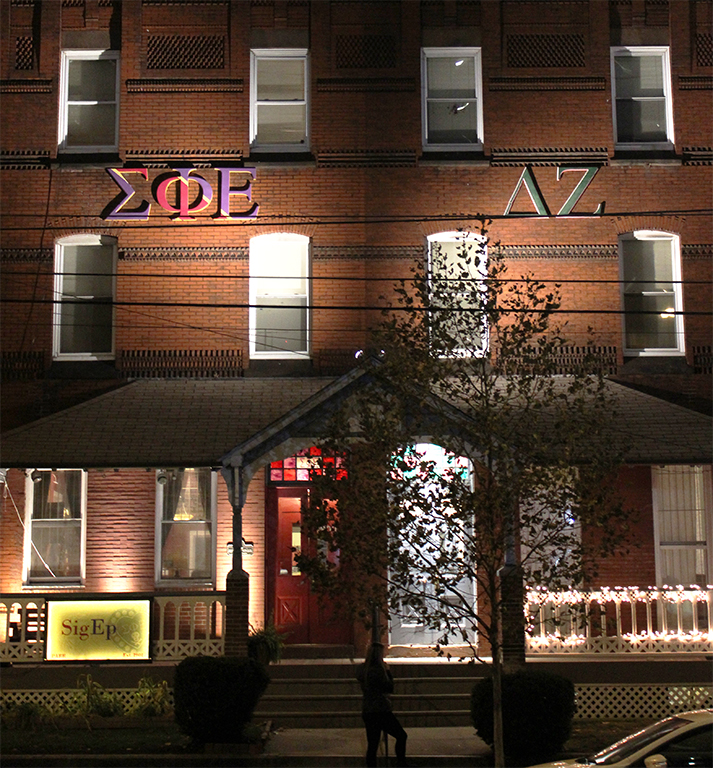
During my first week in America — which was mostly spent with my friend trying to kit out our empty apartment while jet-lagged into next week — one question from my friends at home kept cropping up: are fraternities and sororities actually real over there?
After spending one of my more surreal nights wandering around Poweltown Avenue during Night On The Row — being shown around mansions decked out with giant Greek letters — I could confirm that they were indeed, absolutely real.
Despite the incredulity I felt at their existence outside of American films and TV shows, I don’t want to decimate fraternities or sororities. As a Brit who has been in this country for less than three months I feel reluctance in passing judgment on Drexel’s Greek life — especially as it’s presence is small when compared to colleges elsewhere.
I have no doubt that many of the horror stories that make it across the pond about fraternity parties are true. Drexel’s Tau Kappa Epsilon was suspended for five years in 2017 following particularly nasty sexual assault investigations, and there are various fly on the wall stories about unpleasant initiations from both genders of the Greek life.
However, from speaking to people who are members of either sororities or fraternities, I’ve also heard stories fueled by the sense of community, support, genuine happiness and everything in between.
This doesn’t diminish some of the thoughts I have had about their presence on campus — that it feels like universities in the US take the equivalent of similarly toxic “lad culture” found in UK universities and legitimize it by giving them giant mansions and merchandise — but instead, I found that my unease surrounding them came from a deeper reality about being social at Drexel.
From what I can gather, Drexel can be a lonely place. People are overworked, struggling financially and often feel isolated. Fraternities and sororities offer a solution to this, but for a literal price. But here’s the thing: this is something Drexel advocates. Greek Life offers an answer to the isolation felt by students — they get to be a part of a convenient, ready-made social group.
They come with an identity and are highly likely to cultivate friends through it. They come with perks. There is nothing wrong with this in essence of course. The issue is that it seems to be one of the only decent ways to feel genuinely connected with people at Drexel, and that costs money. Not only is it expensive to be a member of a sorority/fraternity, but it seems like an intense process to get into one.
In essence, I think that Drexel works it’s students too hard, and this impacts on people’s ability to have a strong social life outside of studies. I’m of the belief that the ability to have a fulfilling social life should be part of the university package — you shouldn’t have to pay to make friends. Male students who are not in fraternities often can’t get into parties, and the emphasis on “ladies get in free” feels riddled with disturbing undertones.
Fraternities and sororities are almost certainly not built for everyone. Scenes from “Night on the Row” — well built frat members revving motorbikes outside their huge mansions or girls in heels dancing provocatively on the porches while blasting club music — seem to play up to the stereotypes seen across the pond. Of course, there’s nothing inherently wrong with this, but to a nervous freshman (or exchange student) it can suggest that there is a right and a wrong way to fit in at college.
This is by no means saying that university life in the UK, by comparison, is perfect. Clubbing is a lot is fun, and going to the pub all the time is great. However, the intensity of the drinking culture highly fuelled by peer pressure, can be exhausting and unhealthy. I know I felt incredibly isolated in my often empty and silent flat in first year, despite going out partying and having time on my hands.
University can also be lonely no matter where you are, and the poor mental health of students is something that crops up time and time again. Drexel does its students no favors in terms of promoting a healthy work/life balance and time to socialize properly outside of studies. Fraternities and sororities, regardless of your opinion of them, shouldn’t be the only answer to ensuring you don’t feel isolated at university.


